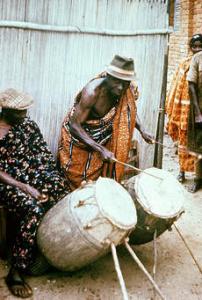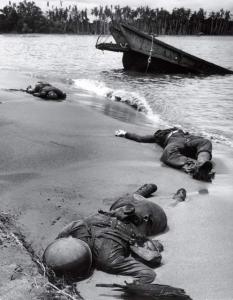Or-gum; Or-gum Pt 2
Do not stop till you get to the last page of this Or-gum; Or-gum series. it is hilarious but its is also scary; very very scary.
Or-gum; Or-gum Pt 2
by DavidBokolo“Why is everybody deserting the village just for a wake-keep?” Tubonah asked.
“Tubo, you have to understand that burial attendance is reciprocatory,” Ebimote told him. “The ceremony is made livelier by the size of the crowd that graced the occasion. So, everybody within the neighborhood would want to be present; in the event that it happens to another person, he would have others to attend to him.”
I was listening to him partially; my attention was drawn to the shouting and callings of names by children in the village. I knew that not everyone in Enyumuama would be going to the burial ceremony.
That naturally was not spite; some have just returned from their farm work and were busy preparing their evening meal: I can hear the sound of pounding of pepper on their mortar. That would take them into late in the evening; I can see the plume of smoke spilling from the thatched roof of some of the houses. One cannot query the reason why they would not attend the ceremony.
Though burial ceremonies were also held on Fridays to allow for greater participation, it was not always the rule. I was wondering how they were able to preserve the corpse till now, if the death had occurred early in the week.
I looked at Ebimote, “When did the person die? I mean the burial they are attending today.”
“It must have been over three days now. You remember we were coming from school when we first heard the Ekere early this week,” he recalled. “You were complaining of the drum as we were walking home from school along the bush track. Though, then, we did not know from which village the sound of the drum was coming from. You were looking around fugitively,” he said laughing.
“Ah, you are now exaggerating my feelings. I was not afraid. I was just wondering that the drum might not be from our village.”
“Okay, whatever. And early this morning, there was the sound of the cannon shot.”
“The sound of that cannon shot was very loud,” Tubonah reflected. “It shook the frame of our windows. I thought it was a very powerful thunder strike.”
“They must have used the Indofarah (Breast-less) cannon. You know, that is the biggest cannon they have in the Nembe kingdom; it usually sound so loud that anyone can hear it from every part of the Kingdom when it is fired,” Ebimote observed
“I wonder how they were able to carry those heavy cannons and be firing them in their war canoes in those days,” I said. “Well, they were using some very big canoes as war canoes then, I presumed. Anyway, the shot of cannon was to officially announce the death of a citizen. That was what my father told us.”
“Yes, and very soon, they will be shooting another one in the evening, announcing that the body was now lying in state, ready for the wake-keep,” Ebimote concluded for me.
“What about your father?” I asked him. “Would he be going to the burial ceremony?”
“No, he won’t be going. He just returned from a journey, and he said he’s tired.”
“And I guess your mother travelled. I knew she went to her maternal grandmother's village. I think I would pass the night in your house”
“Oh, ho, you are afraid to sleep in your house with your parents out of the village, aren’t you?
“No, I’m not. Did I not sleep in your house two nights ago?”
“Just kidding,” he said patting my right shoulder.
I stood up, “I had to get to the house before my parent leave for Iseleogono.” Waving them good-bye, I ran the few meters to our house.
My father looked at me as I came into the sitting. He was in his late thirties, stoutly built man. All the years of toiling in the high seas had not diminished his handsomeness. He must have been quite handsome as a young man.
He was wearing a chieftaincy mini don, tying a judge wrapper that was knotted at the top and the middle edges by his right-hand side. There was a slit from the knot showing a white short he was wearing under the wrapper.
There was a pair of black bowler hat and his walking stick on the table and a pair of black shoe on the floor beside the table. I knew he will not be putting on the shoe and the hat on the canoe ride to Iseleogono. He will only put those on when they are there.
My sister was helping our mother to tie her hair-tie. They were struggling with the hard nylon fabric to allow it to settle on her hard.
“Mama, I thought you were already packing your things to the canoe?” I asked, watching the struggling women.
“Is that all you can say? Why can’t you come assist us by holding these pins or holding the edge of the hair tie?” and she pushed a packet office pin into my hand.
“What will I be doing holding the edge of the hair tie for with the two of you struggling with it?”
“Then keep quiet and watch,” our mother breathed out.
I turned to look at my father sitting silently watching the two women.
“Papa, did you know the man that died?”
“You mean the one we are going to attend the burial?”
“Yes”
“Of course; to say I knew him is even an understatement. We were from the same compound in Nembe. He was living here with his family. He left here for his ancestral home in Iseleogono in the year Nigeria got her independence; that was about some six years ago. That was about three years after you were born.”
“It is like we are doing an Enyumuama burial in Iseleogono,” I reflected.
He nodded his head, “by the way, where is Gilbert and Tari, your brothers?’
“I don’t know, I think they went out to play with their friends,” I said.
“Muna, do go and look for them, ask them to get into the house before nightfall.”
“Okay, papa, but they are big enough to take care of their selves and should come home when it is dark. Even fowls knew when it is dark to go home to roost,” she said, turning to look at him from her labour. They have been able to pack the hair properly into the hair tie.
“Papa, it is me you should be worried about to take care of,” I said, thumbing my chest. I‘m twelve years old, they are 16 and 14; big boys. But I have already told Ebimote that I will be passing the night in their house.”
Three pairs of eyes turned to look at me.
“What’s that suppose to mean?” my mother asked, her eyes flaring.
“Nothing, I have been sleeping in their house before.’
“Don’t mind Inifie, Mama. I think he’s afraid of sleeping here today because you and Papa will be away,” my sister said.
“It’s okay, he’s been sleeping there even when we were at home,” my father came to my rescue.
I made a face at her as we starting packing their bags to the canoe and bid them good night as they paddled downstream into the gathering darkness, toward Iseleogono where the sound of the ekere drum insistently summoning the spirits of the dead to witness the initiation of another spirit coming to join the realm of the underworld.
I cannot help it but that was the feeling I have about the ekere drum. While literarily, the lyrics of the drum was interpreted to mean the announcement about the dead, to the communities, and also acting as an instrument of calling of titles of men at ceremonies; it could also pass on a spiritual interpretation to the departing soul to joining with his ancestors: whatever that is been interpreted naturally could have a spiritual interpretation.
I listened to the lyrics of the drum from the distance, gon-gon-gon-kri-gon-gon, and the sound floating to all the villages within the clan. I looked around the village, as I stood by the bank of the river; the darkness was pushing itself through the surrounding giant trees and seemed to be obliterating it from the grip of the daylight.
I could imagine the shadows of spirits that would be coming in with the shadow of the night to walk the lawns of the village when mere mortals lay dreaming on their beds; only to be freighted away as the light of morning come pushing the darkness of night away.
More from DavidBokolo
The Weightless Weight
by DavidBokolo
Some times we got weight down by thoughts and imagination that do not have weight. the sooner we realize that, we'll be up and going. So says the old man
- Aug, 3 2015
- Lyric
"You Ripped my Love Into Shreds"
by DavidBokolo
Too much love of the cat, they say, kills the moth. Most love relationship got broken as a result of wrongly managed petty frail nerves. Like as I love to say, just musing.
- Sep, 11 2015
- Free Verse
Sing Me Another Love Song My Love
by DavidBokolo
I held on to my Love and refused to let Him go even when I feel him slipping away
- Sep, 15 2015
- Free Verse Lyric
"And Yet The battle Rages On"
by DavidBokolo
There are many unsung Heroes whose heroism is lost in time and space
- Sep, 23 2015
- Prose
I Wish I Could Rewind The Time
by DavidBokolo
I wish I had Known Him many years ago, It,s not too late now though, but I wish I could rewind the time
The One Who Bears My Burden
by DavidBokolo
In sequel to a previous poem, 'Sweet Memories Lingers', Good always sail over our pains if we take time to ponder.
- Aug, 27 2015
- Prose







